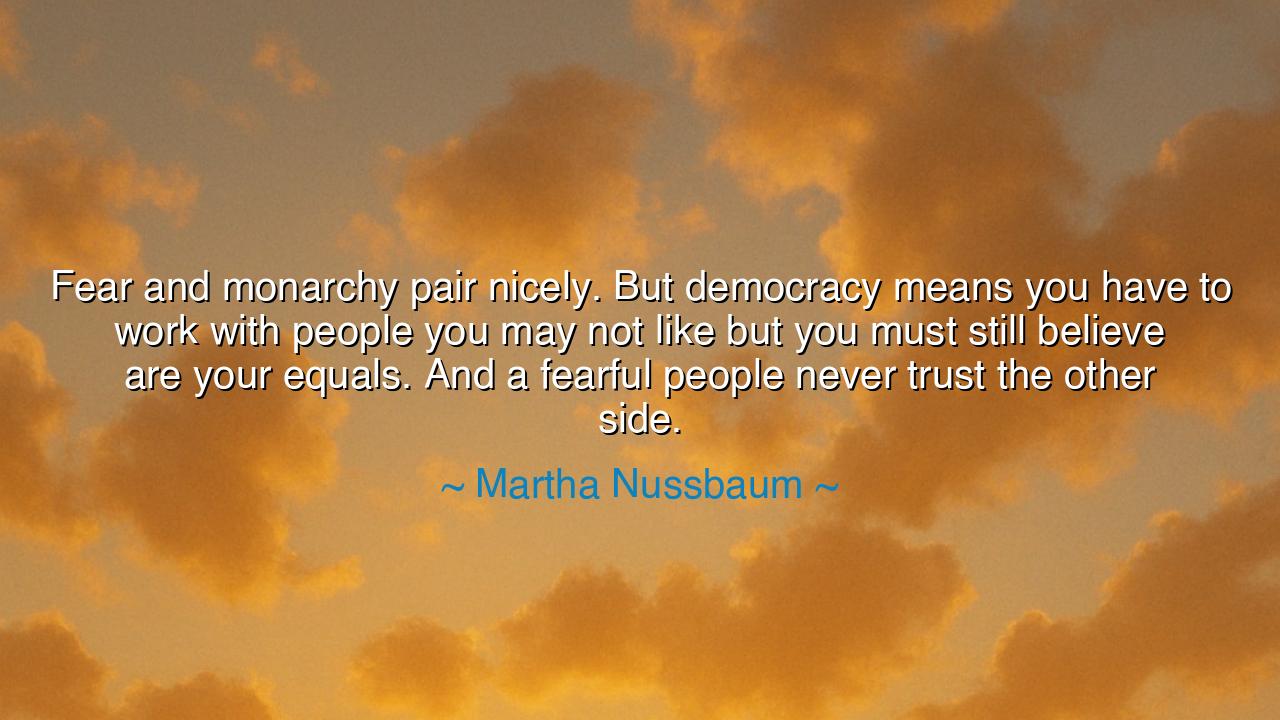
Fear and monarchy pair nicely. But democracy means you have to
Fear and monarchy pair nicely. But democracy means you have to work with people you may not like but you must still believe are your equals. And a fearful people never trust the other side.






“Fear and monarchy pair nicely. But democracy means you have to work with people you may not like but you must still believe are your equals. And a fearful people never trust the other side.” Thus speaks Martha Nussbaum, a philosopher of our age whose words echo like the maxims of antiquity. In her teaching, she uncovers the ancient truth that fear is the ally of tyranny, while courage and recognition of equality are the lifeblood of democracy. For where fear reigns, people turn willingly to rulers who promise safety at the cost of liberty. But where trust is nurtured, men and women can walk side by side as equals, even in disagreement, and thus build a society founded not on trembling obedience, but on shared dignity.
The ancients knew this contrast well. In Persia and Babylon, in the kingdoms of Pharaohs, fear was the chain that bound subjects to their kings. The monarch was elevated as divine, and the people bowed low, terrified to dissent. In such a world, fear and monarchy indeed paired nicely, for the silence of terror made rule appear eternal. But in Athens, when the people gathered in the assembly, there was no king to command them—only citizens to persuade each other. There, the burden was heavier, for a man had to listen to his neighbor, even if he despised him, and accept him as an equal in the shaping of the city’s fate. It was a harder road, but nobler, for it required not obedience, but recognition of shared humanity.
Consider the American Civil War, a time when democracy itself cracked under the weight of mistrust. The nation, born in the language of equality, became a house divided. Fear poisoned discourse: the North feared the expansion of slavery’s injustice, the South feared the destruction of its way of life. Hatred grew, and trust between sides vanished. The result was bloodshed—brother against brother, citizen against citizen. Nussbaum’s words remind us that the failure to see one another as equals leads not to governance but to ruin. Only when democracy heals its divisions and restores mutual respect can it endure.
And yet there are brighter examples. Think of South Africa, where after decades of apartheid, the people stood at the brink of vengeance. But Nelson Mandela, though imprisoned for long years, refused to let fear be the guiding spirit of the new nation. He declared his enemies to be his fellow citizens, his former jailers to be his equals. By choosing reconciliation over revenge, he breathed life into democracy, showing that even in the ashes of hatred, the seed of equality can grow. It was not easy, nor was it perfect, but it proved that democracy demands courage greater than fear, and faith greater than suspicion.
The teaching is clear: democracy is not the rule of angels, but the work of flawed men and women who must learn to labor together despite dislike, despite division. It requires the discipline of seeing one’s opponent not as an enemy to be destroyed, but as a fellow citizen to be heard. Without this discipline, fear creeps in, whispering that the other side is dangerous, unworthy, untrustworthy. And once that poison takes hold, democracy falters, for a people consumed by fear will trade away liberty for the false safety of tyranny.
Practical wisdom must follow. In our daily lives, when we encounter those we dislike, resist the urge to dismiss them. Instead, practice the art of recognition: “Though I differ from you, yet you are my equal.” In debates, choose not the easy weapon of insult, but the harder path of listening. In times of division, seek not only those who echo your voice, but those who challenge it, for in that clash of equals, democracy breathes. And above all, guard yourself against the merchants of fear—those who profit by dividing citizen against citizen—for they are the heralds of monarchy disguised in modern clothes.
Thus, Nussbaum’s words shine as both warning and beacon. Fear may suit kings, but it destroys republics. Democracy is fragile, for it requires trust among those who differ, respect among those who quarrel, equality among those who oppose. Yet if we can master our fear, if we can see even the adversary as a partner in shaping the common good, then democracy will not only endure—it will flourish. And so I say to you: cast away fear, embrace trust, and walk beside your fellow citizens as equals. For only then will liberty live, and only then will democracy triumph.






AAdministratorAdministrator
Welcome, honored guests. Please leave a comment, we will respond soon